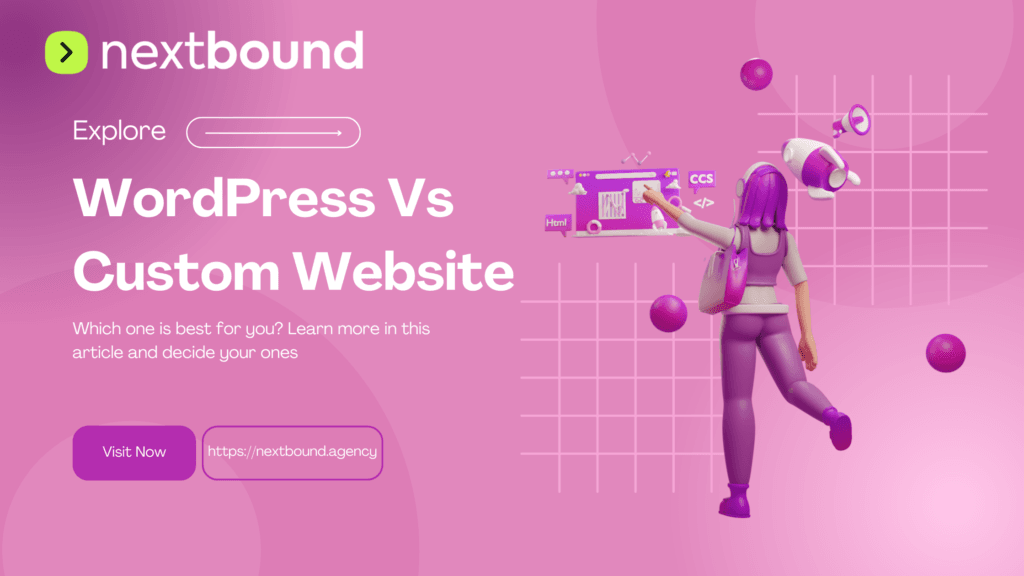Introduction
When building a website, one of the first decisions you’ll need to make is choosing between WordPress vs Custom Website Development. Both have their advantages and drawbacks, and the right choice depends on your business needs, budget, and technical expertise.
In this article, we’ll explore the pros and cons of WordPress vs Custom Website, their key differences, and which option is better suited for your business.
Understanding WordPress and Custom Website Development
What is WordPress?
WordPress is an open-source content management system (CMS) that powers over 43% of all websites on the internet. It offers a user-friendly interface, pre-built themes, and thousands of plugins to enhance functionality. WordPress makes it easy for business owners, bloggers, and developers to create and manage websites without extensive coding knowledge. Whether you need an eCommerce store, a portfolio, or a corporate website, WordPress provides flexible solutions.
What is Custom Website Development?
Custom website development involves building a website from scratch using programming languages like HTML, CSS, JavaScript, and PHP. Unlike WordPress, custom websites are tailor-made to meet specific business requirements and have no dependency on pre-built themes or plugins. Businesses that require advanced features, unique design elements, or high scalability often prefer custom website development.
WordPress vs Custom Website: Key Differences
Pros and Cons of WordPress vs Custom Website Development
Pros of WordPress
-
Easy to Set Up: No coding skills required; ideal for beginners.
-
Wide Range of Plugins: Extend functionality without custom coding.
-
SEO-Friendly: Comes with built-in SEO tools and plugins like Yoast SEO.
-
Cost-Effective: Lower development costs compared to custom websites.
-
Large Community Support: Millions of users and developers available for support.
-
Regular Updates: WordPress is frequently updated for security and functionality enhancements.
Cons of WordPress
-
Limited Customization: Restricted by themes and plugins.
-
Security Risks: Vulnerable to hacking if not regularly updated.
-
Plugin Dependence: Too many plugins can slow down performance.
-
Scalability Challenges: Large-scale businesses may face performance issues with WordPress.
Pros of Custom Website Development
-
Fully Customizable: No restrictions on design and functionality.
-
Better Performance: Optimized code results in faster loading times.
-
Higher Security: Reduced vulnerability to common hacking attempts.
-
Scalability: Built specifically to handle high traffic and business growth.
-
Advanced SEO Implementation: Complete control over on-page SEO, schema markup, and technical SEO optimization.
Cons of Custom Website Development
-
Higher Cost: Requires a larger budget for development and maintenance.
-
Longer Development Time: Can take weeks or months to complete.
-
Requires Technical Knowledge: Needs professional developers for updates and maintenance.
-
Ongoing Support Required: Unlike WordPress, custom websites often require dedicated support for updates and troubleshooting.
WordPress vs Hand-Coded Website: Which One is Better?
If you need a simple, cost-effective solution, WordPress is a great choice. However, if you require a fully customized website with specific functionalities, a hand-coded website (custom website development) is the better option. Businesses that demand unique user experiences, custom database structures, or advanced integrations benefit more from custom websites.
Custom Website vs WordPress: Which One Should You Choose for Business?
Choose WordPress If:
-
You are a small business or entrepreneur with a limited budget.
-
You need a website up and running quickly.
-
You prefer a CMS with an easy-to-use interface.
-
You want access to pre-designed themes and plugins.
-
You are comfortable handling regular updates and security patches.
-
You want an SEO-friendly platform with plugins to optimize your content.
Choose Custom Website Development If:
-
You require unique functionalities that plugins can’t provide.
-
Your business needs a high-performance, scalable website.
-
You want complete control over security and performance.
-
You have the budget to hire professional developers.
-
You need a fully custom design that aligns with your brand identity.
-
Your website requires complex integrations, such as CRM, ERP, or API connections.
WordPress or Custom Website for Business: A Final Comparison
Both WordPress vs Custom Website for Business have their strengths and weaknesses. If your priority is ease of use, quick deployment, and affordability, WordPress is an excellent choice. However, if your business requires advanced features, superior performance, and complete control, custom website development is the way to go.
Conclusion
Deciding between WordPress vs Custom Website Development depends on your business goals, budget, and long-term strategy. While WordPress is ideal for small businesses and quick website launches, custom development is the best choice for businesses that require a high level of customization, performance, and security.
Whichever option you choose, ensure it aligns with your business needs and future growth plans. If you need expert advice, consult with a professional web developer to make the best decision.

